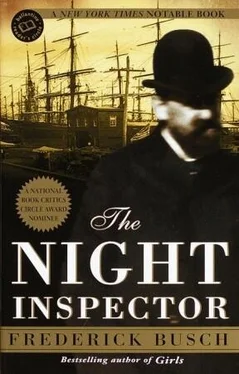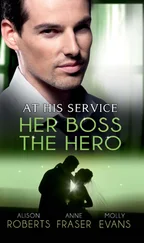The dampness of the dark forest, the distant smell of horse manure and horses, unwashed men, the smell of roasted rabbit which Burton had trapped, and something almost rotten, perhaps my own terrified sweat that rose about me as I moved in the forest, seeking someplace solitary where I might huddle with my arms about my own knees and thus take hold of myself for what comfort I might provide while I shook — that was all of what seized me at Leonard Street. I was near a notorious alleyway in the Points, running as it did behind a terrible crib above a vicious saloon, and situated as it was above a tunnel that came from the central sewers. It was here that we had seen enormous rats, and where more than one infant, left alone in its blankets and sucking on a flavored bit of ice, had been attacked while the mother was seeing to her business within. The minders they hired were cripples and drunks who were of little use but who, for a penny or two, claimed to keep an eye upon the babes, and to comfort them if they required attention. The flavored ice was offered in place of food, and they soon enough dropped it because of the cold or because their little fingers could not manage the grip.
I wondered if the worst element I smelled was something dead. The alley was lighted only from the windows above, and few of them were illuminated at that moment. I saw motion in the alley’s mouth, not far from where I had paused, and I took hold of my pistol and cocked it. I wanted any observer to hear that I was armed. And no one in those streets at night could mistake the cocking of a gun. It is a cold and very clear and ultimate sort of sound, tending to carry much farther than you might imagine, even in the clamor of those streets. And then, because I was alert to menace, as was often the case, I found myself drawn to it — sooner the ugly stench and almost liquid darkness of the alley, I chided myself, than a street I must share with a pig of the streets.
I walked slowly into the alley, and light from the thoroughfare disappeared as if the lamps had been blown out. I waited then in the dark, for my eyes to grow accustomed to it. And soon enough, I could see motion farther in, and then see figures. A piece of the street seemed to rise, and I understood that someone had opened a cellarway or a cover for one of the new drains meant to accommodate the rising tides of sewage and the floods of fresh water from storms. I closed my eyes, and I smelled what I had smelled during the War, when I went off into the woods to shake and weep. Some of that was the concentration of cooking odors and the general stink of stained bedclothes and unhealthy whores. Some was cheap or debased spirits. Some was the corruption of household and commercial garbage in mounds that had been heaped against the bricks and clapboard of the structures that formed the alley. There was probably a dead dog or cat or even horse that rotted under one of the mounds — it might have been a person; so many went missing in these places and never were found — but I could, for all my efforts, not identify the deep and rank and familiar olfactory note that probably, of all the smells, had brought me into this other world abutting the more familiar one.
As I walked farther in, toward the part of the walkway that had risen, I listened, through the mechanical piano playing and the shrieks of false gaiety, the grumbling deep noises of men at rut or next door to stupor, for a sound betokening threat. I heard it — a mechanical grating at once thin and loud: the cocking of a weapon — as I recollected the nature of the smell. It was fear, which had driven me before it into the forest during the War. I sniffed at my own odor and wondered whether it was derived from my being here, or whether my fear of the morrow, and our rescue, and its consequences, had sent me down the alleyway.
I stood in my place, the pistol in my hand, which hung at my side. “Good evening,” I said into the darkness.
“You’re here for a reason?”
“The reason is that I didn’t go somewhere else.”
Someone laughed. Light came up then from the stones of the street itself, and I saw that they — I made out two of them in the light — had been in the sewers and were emerging, or were about to descend.
From up the alley a woman’s voice called, “They opened hell again, girls!”
“I will not do a swallow-cock on Satan,” another woman replied. “My throat’s off duty for the night.”
The first one replied, “Yes, dearie, but the mouth in your ass does double duty, doesn’t it?”
“Is your business with me?” the man called softly.
“What’s your business, then?”
“You would know, if you were supposed to be here.”
“You’re one of the Swamp Angels,” I said. “Did you escape from the Tombs? Or are you some other municipality’s prisoners? Former prisoners,” I amended.
“You’re police?”
I went closer. I cannot say why I was thus drawn. Perhaps I was driven by my fear to prove — to me, perhaps somehow to it —that I would not be controlled; surely, I seemed to need to assert it to the man with the weapon. In the light that came up, a poor and wavering light, so perhaps from a lantern or candles, I saw that he wore a dark, dirty kerchief around his mouth and nose below his eyes. The smell of raw sewage rose with the light, and it was possible that he wore the mask against the stench, although, seeing my veil, he seemed actually to become less apprehensive and to make something of a show of uncocking his pistol, a large, nickel-plated weapon with a snubbed barrel. I uncocked the.31 and replaced it in my belt, at the back, beneath my coat. His clothes looked shabby and long unwashed. His shoes were surprisingly delicate in appearance and workmanship, and I suspected that he wore them beneath fisherman’s boots that he had discarded on his way up.
“You aren’t police,” he said. “We don’t invite visitors. We turn them away. Some of us were about to come up for, well, recreation.”
“One of them said her jaws were tired.”
“All of them have more than jaws.”
A stovepipe head slowly rose in the light and the terrible smell, and then a small man wearing a white muslin mask about his mouth and nose came up beneath it. He had one eye and a puckered hole where the other had come out. He was missing most of his ear on that same side, and his stovepipe listed in the same direction. He noted my veil, I saw, and was assured.
“Evening,” I said. “Or is it morning now?”
“Soon,” the little fellow said.
I noted the approach of the second man I had initially observed. He wore a long coat that nearly touched the stones of the alley, and a sailor’s wool cap. I had thought, at first, that I saw M in his oilskins, but this was a man with no beard I could see who also wore a mask he had fashioned from a large, figured red bandana. He stood beside the first man and then walked around him to stand closer to me. Even his eyes, little and fatigued, slightly closer together than in most faces, reminded me of M. We had stood at the wharfs one late afternoon, when after my own day’s work I had come to meet him at the conclusion of his. We were to take a meal, and drink some strong ale, and tell stories. He had, always, to tell stories — they were his only form of intimacy, Sam had said, upon meeting him. It was a point with which I could neither agree nor disagree, for I did not wholly understand its meaning.
But there we stood, he in his long oilskin coat and watch cap, I unprotected from the rain except by my hat. I had stowed the mask beneath my coat, to protect it, and was holding the veil in place as the winds came in with some force. M had scrupulously observed me as I held the mask and sited it beneath the jacket of my suit, which I fastened with some care. He looked at my face as I covered it and replaced my hat.
Читать дальше












